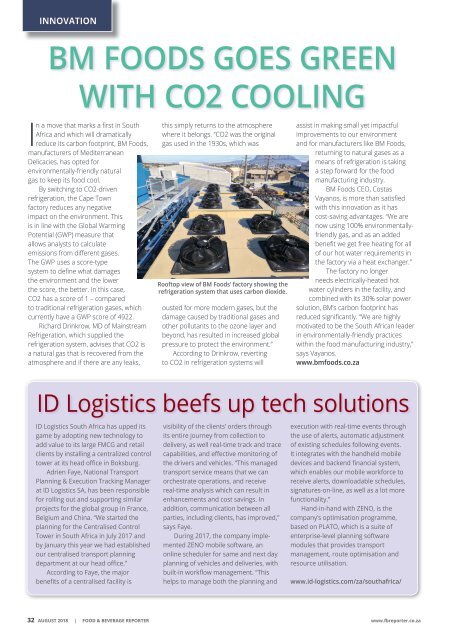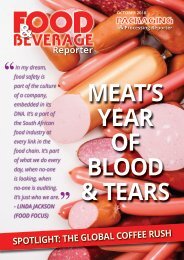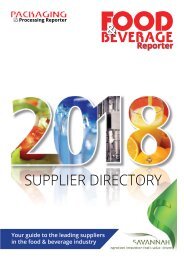Food & Beverage Reporter August 2018
South Africa's leading B2B magazine for the food & beverage sector and its allied industries in processing/packaging etc
South Africa's leading B2B magazine for the food & beverage sector and its allied industries in processing/packaging etc
Create successful ePaper yourself
Turn your PDF publications into a flip-book with our unique Google optimized e-Paper software.
INNOVATION<br />
BM FOODS GOES GREEN<br />
WITH CO2 COOLING<br />
In a move that marks a first in South<br />
Africa and which will dramatically<br />
reduce its carbon footprint, BM <strong>Food</strong>s,<br />
manufacturers of Mediterranean<br />
Delicacies, has opted for<br />
environmentally-friendly natural<br />
gas to keep its food cool.<br />
By switching to CO2-driven<br />
refrigeration, the Cape Town<br />
factory reduces any negative<br />
impact on the environment. This<br />
is in line with the Global Warming<br />
Potential (GWP) measure that<br />
allows analysts to calculate<br />
emissions from different gases.<br />
The GWP uses a score-type<br />
system to define what damages<br />
the environment and the lower<br />
the score, the better. In this case,<br />
CO2 has a score of 1 – compared<br />
to traditional refrigeration gases, which<br />
currently have a GWP score of 4922.<br />
Richard Drinkrow, MD of Mainstream<br />
Refrigeration, which supplied the<br />
refrigeration system, advises that CO2 is<br />
a natural gas that is recovered from the<br />
atmosphere and if there are any leaks,<br />
this simply returns to the atmosphere<br />
where it belongs. “CO2 was the original<br />
gas used in the 1930s, which was<br />
Rooftop view of BM <strong>Food</strong>s’ factory showing the<br />
refrigeration system that uses carbon dioxide.<br />
ousted for more modern gases, but the<br />
damage caused by traditional gases and<br />
other pollutants to the ozone layer and<br />
beyond, has resulted in increased global<br />
pressure to protect the environment.”<br />
According to Drinkrow, reverting<br />
to CO2 in refrigeration systems will<br />
assist in making small yet impactful<br />
improvements to our environment<br />
and for manufacturers like BM <strong>Food</strong>s,<br />
returning to natural gases as a<br />
means of refrigeration is taking<br />
a step forward for the food<br />
manufacturing industry.<br />
BM <strong>Food</strong>s CEO, Costas<br />
Vayanos, is more than satisfied<br />
with this innovation as it has<br />
cost-saving advantages. “We are<br />
now using 100% environmentallyfriendly<br />
gas, and as an added<br />
benefit we get free heating for all<br />
of our hot water requirements in<br />
the factory via a heat exchanger.”<br />
The factory no longer<br />
needs electrically-heated hot<br />
water cylinders in the facility, and<br />
combined with its 30% solar power<br />
solution, BM’s carbon footprint has<br />
reduced significantly. “We are highly<br />
motivated to be the South African leader<br />
in environmentally-friendly practices<br />
within the food manufacturing industry,”<br />
says Vayanos.<br />
www.bmfoods.co.za<br />
ID Logistics beefs up tech solutions<br />
ID Logistics South Africa has upped its<br />
game by adopting new technology to<br />
add value to its large FMCG and retail<br />
clients by installing a centralized control<br />
tower at its head office in Boksburg.<br />
Adrien Faye, National Transport<br />
Planning & Execution Tracking Manager<br />
at ID Logistics SA, has been responsible<br />
for rolling out and supporting similar<br />
projects for the global group in France,<br />
Belgium and China. “We started the<br />
planning for the Centralised Control<br />
Tower in South Africa in July 2017 and<br />
by January this year we had established<br />
our centralised transport planning<br />
department at our head office.”<br />
According to Faye, the major<br />
benefits of a centralised facility is<br />
visibility of the clients’ orders through<br />
its entire journey from collection to<br />
delivery, as well real-time track and trace<br />
capabilities, and effective monitoring of<br />
the drivers and vehicles. “This managed<br />
transport service means that we can<br />
orchestrate operations, and receive<br />
real-time analysis which can result in<br />
enhancements and cost savings. In<br />
addition, communication between all<br />
parties, including clients, has improved,”<br />
says Faye.<br />
During 2017, the company implemented<br />
ZENO mobile software, an<br />
online scheduler for same and next day<br />
planning of vehicles and deliveries, with<br />
built-in workflow management. “This<br />
helps to manage both the planning and<br />
execution with real-time events through<br />
the use of alerts, automatic adjustment<br />
of existing schedules following events.<br />
It integrates with the handheld mobile<br />
devices and backend financial system,<br />
which enables our mobile workforce to<br />
receive alerts, downloadable schedules,<br />
signatures-on-line, as well as a lot more<br />
functionality.”<br />
Hand-in-hand with ZENO, is the<br />
company’s optimisation programme,<br />
based on PLATO, which is a suite of<br />
enterprise-level planning software<br />
modules that provides transport<br />
management, route optimisation and<br />
resource utilisation.<br />
www.id-logistics.com/za/southafrica/<br />
32 AUGUST <strong>2018</strong> | FOOD & BEVERAGE REPORTER www.fbreporter.co.za







